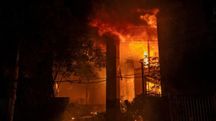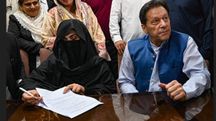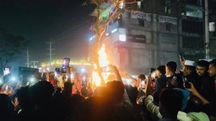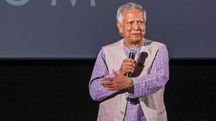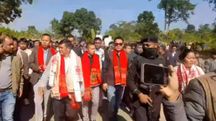Putin wins Russia election in landslide victory
Russian President Vladimir Putin secures a record victory in the country's election amidst criticisms from the West. The election comes at a crucial time for the ongoing Ukraine war and broader geopolitical dynamics.
 Russian Election, Vladimir Putin, Landslide Victory, Western Criticisms, Ukraine War, Geopolitical Dynamics
Russian Election, Vladimir Putin, Landslide Victory, Western Criticisms, Ukraine War, Geopolitical DynamicsRussian President Vladimir Putin secured a resounding victory in the country's election on Sunday solidifying his grip on power in a record post-Soviet landslide. The outcome, which saw Putin garnering 87.8% of the vote according to an exit poll by the Public Opinion Foundation (FOM), cements his already tight control over Russia.
Putin, a former KGB lieutenant colonel who has led the country since 1999, emphasized the significance of the win as a message to the West, asserting Moscow's right to stand up to external pressure, particularly in light of its actions in Ukraine. The election marks a new six-year term for Putin, potentially making him Russia's longest-serving leader in over 200 years if he completes it.
Despite accusations of electoral irregularities from Western nations, including the United States, Germany, and the United Kingdom, Putin dismissed criticisms and portrayed the election as democratic. However, opponents argue that the imprisonment of political adversaries and censorship undermine the fairness of the process.
Communist candidate Nikolai Kharitonov emerged as the closest contender to Putin, securing just under 4% of the vote, followed by newcomer Vladislav Davankov and ultra-nationalist Leonid Slutsky.
In his victory speech in Moscow, Putin pledged to prioritize resolving issues related to Russia's military involvement in Ukraine and reiterated his commitment to strengthening the country's armed forces. He also addressed the recent death of opposition leader Alexei Navalny, describing it as a "sad event" and confirming readiness for a prisoner swap involving Navalny.
Inspired by Navalny, thousands of opponents protested against Putin at polling stations both inside Russia and abroad. However, Putin asserted that these protests had no impact on the election's outcome.
The election took place amidst ongoing tensions with Ukraine, with Putin framing the conflict as a historic battle against Western encroachment. Despite international criticism, Putin's re-election was never in doubt given his control over Russia and the absence of genuine challengers.
Turnout nationwide was reported at 74.22%, surpassing levels from the previous election in 2018. However, there was no independent tally of participation in opposition demonstrations.
Navalny's death has left the opposition without its most prominent leader, further consolidating Putin's dominance. The West continues to view Putin as an autocrat, with Ukrainian President Volodymyr Zelenskiy denouncing the election as illegitimate.
The election comes at a critical juncture for the Ukraine war and broader geopolitical dynamics, with support for Ukraine entangled in U.S. domestic politics ahead of the November presidential election. Despite Kyiv's efforts, Russian forces have made gains following a failed Ukrainian counter-offensive last year.
Copyright©2025 Living Media India Limited. For reprint rights: Syndications Today

